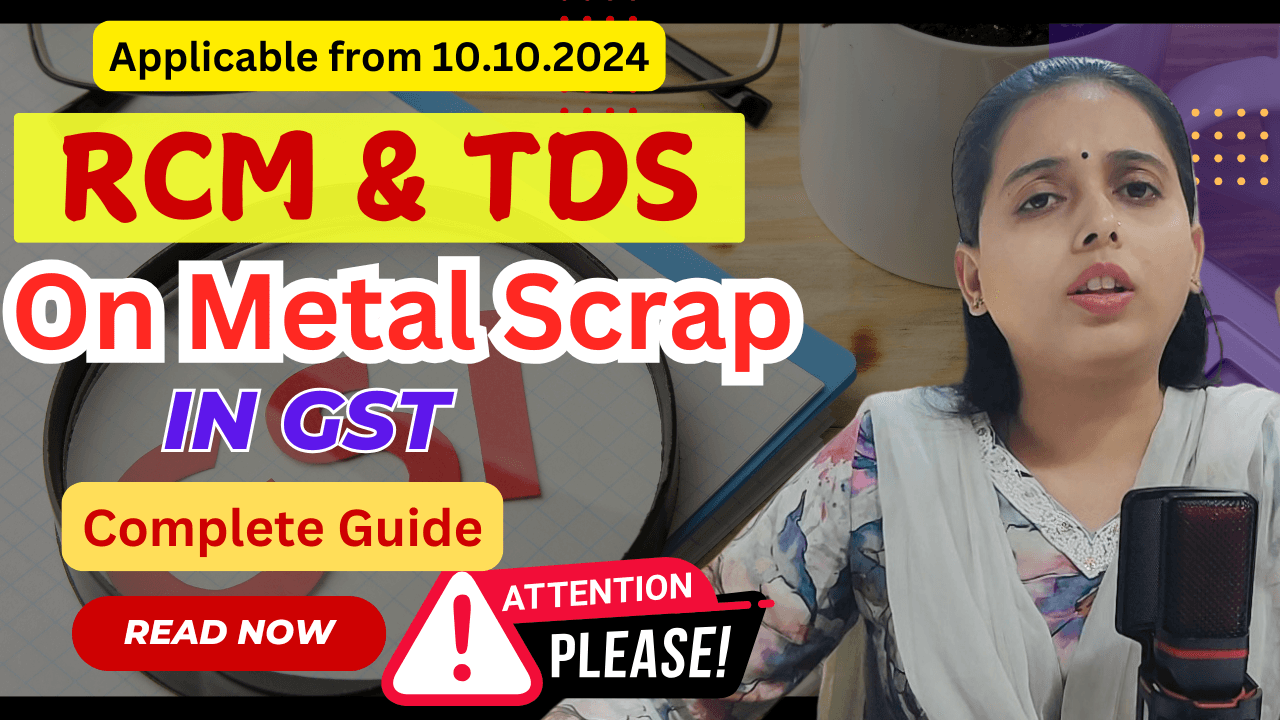GST TDS Now Applicable on Metal Scrap Supplies
GST TDS Now Applicable on Metal Scrap Supplies The Goods and Services Tax (GST) regime, now in its eighth year of implementation, continues to evolve with new updates aimed at enhancing compliance and reducing tax evasion. One of the latest and most significant changes was introduced by the Central Government based on recommendations from the 54th GST Council Meeting. These updates specifically target the metal scrap sector in India, bringing it under stricter regulatory oversight. This blog delves into the recent amendments regarding Tax Deducted at Source (TDS) and the Reverse Charge Mechanism (RCM) for metal scrap supplies and explains their impact on businesses.
Background: TDS Provisions under the CGST Act
The TDS provisions under the GST were first introduced in Section 51 of the CGST Act, 2017, but were made effective from October 1, 2018. GST TDS Now Applicable on Metal Scrap Supplies This section mandates certain recipients of goods and services (the deductors) to deduct tax at a prescribed rate from payments made to suppliers (the deductees) and remit it to the government. Until recently, this TDS obligation primarily applied to government bodies and Public Sector Undertakings (PSUs).
However, Section 51(1)(d) of the CGST Act empowers the government to notify additional categories of taxpayers who would be liable to deduct TDS. GST TDS Now Applicable on Metal Scrap Supplies Following this provision, the 54th GST Council made two game-changing recommendations concerning the metal scrap sector:
- Implementation of the Reverse Charge Mechanism (RCM)
- Introduction of TDS on B2B metal scrap supplies
Reverse Charge Mechanism (RCM) for Metal Scrap Suppliers
GST TDS Now Applicable on Metal Scrap Supplies One of the key recommendations from the GST Council was the introduction of the Reverse Charge Mechanism (RCM) for metal scrap. This mechanism requires the registered recipient of metal scrap to pay GST on supplies made by unregistered suppliers.
Key Points of the RCM Update:
- The reverse charge applies when an unregistered person supplies metal scrap to a registered person.
- The responsibility for paying GST shifts from the supplier to the recipient.
- Unregistered suppliers must obtain GST registration as soon as their supplies cross the threshold limit set under GST law.
- Important: The recipient is required to pay the GST under RCM even if the unregistered supplier’s turnover is below the threshold limit for GST registration.
This move ensures that tax compliance is maintained even in transactions where unregistered suppliers are involved, closing potential loopholes that could lead to tax evasion.
TDS on Metal Scrap: B2B Supplies Now Covered
The second major change comes in the form of the extension of TDS provisions to the B2B supply of metal scrap. According to Notification No. 25/2024-Central Tax dated 09.10.2024, businesses involved in the procurement of metal scrap are now required to deduct 2% TDS on the payments made to registered suppliers of metal scrap.
Who is Liable to Deduct TDS?
- Registered recipients who purchase metal scrap from other registered suppliers are liable to deduct TDS at the rate of 2%.
- This provision applies to metal scrap classified under Chapters 72 to 81 of the Customs Tariff Heading (CTH).
Impact on Businesses:
- Compliance Requirement: Businesses that deal in metal scrap supplies will need to modify their accounting and payment systems to account for TDS deductions.
- Cash Flow Management: Suppliers will need to be mindful of cash flow management as the TDS deduction will reduce the immediate payment they receive, though they can claim this as a credit.
- Record-Keeping: Both recipients and suppliers will need to maintain accurate records to ensure compliance with the new TDS provisions.
Effective Date of the New Provisions
The RCM provisions for unregistered metal scrap suppliers were made effective through Notification No. 06/2024-Central Tax (Rate), which was issued on October 8, 2024 and came into effect on October 10, 2024.
The TDS provisions for B2B metal scrap supplies were implemented through Notification No. 25/2024-Central Tax, which was issued on October 9, 2024, and is also effective from October 10, 2024.
Why These Changes Matter
The metal scrap sector has long been considered a fragmented industry with many unregistered suppliers, making it challenging for tax authorities to ensure compliance. By introducing RCM and TDS provisions in this sector, the government aims to:
- Plug revenue leaks by ensuring that tax is paid even on supplies made by unregistered persons.
- Enhance transparency in the transactions within the metal scrap supply chain.
- Encourage formalization of the sector by nudging unregistered suppliers toward registration under GST once their turnover exceeds the threshold limit.
These measures, though initially adding to the compliance burden for businesses, are expected to foster a more organized sector with better tax compliance.
Conclusion
The introduction of TDS on B2B metal scrap supplies and the Reverse Charge Mechanism (RCM) for unregistered suppliers of metal scrap represents a major regulatory shift in India’s GST framework. Businesses operating in the metal scrap sector must gear up to meet these new compliance requirements, effective from October 10, 2024. By ensuring that taxes are deducted and paid at every step, these measures are likely to create a more formalized and tax-compliant sector, benefiting both the government and the broader economy.
For businesses, the focus should now be on updating their processes to adhere to the new TDS and RCM rules. Proper compliance will not only avoid penalties but will also streamline operations within the GST framework, ultimately contributing to long-term sustainability in the metal scrap supply chain.
Stay updated on the latest GST news and compliance requirements by following our blog. If you need assistance with your GST filings or understanding these new provisions, feel free to reach out!
For More Information :https://youtu.be/GkEQQAvM1dc?si=ko78eWtae70fHjYC

